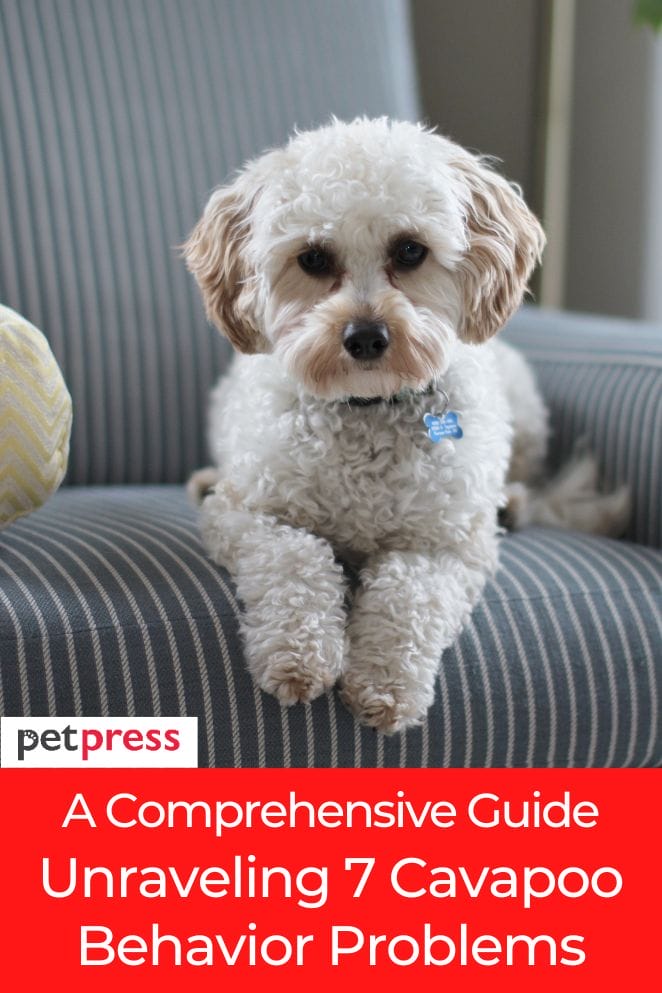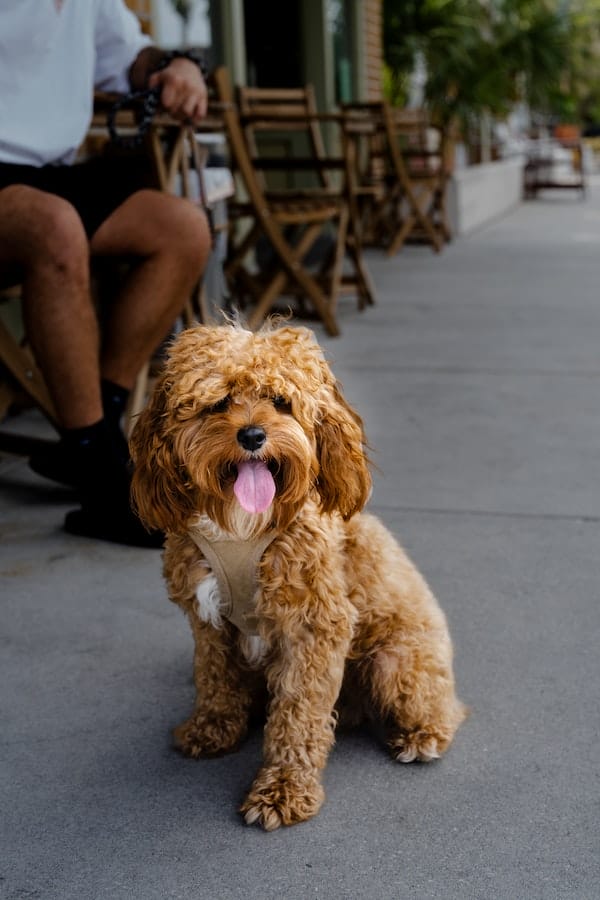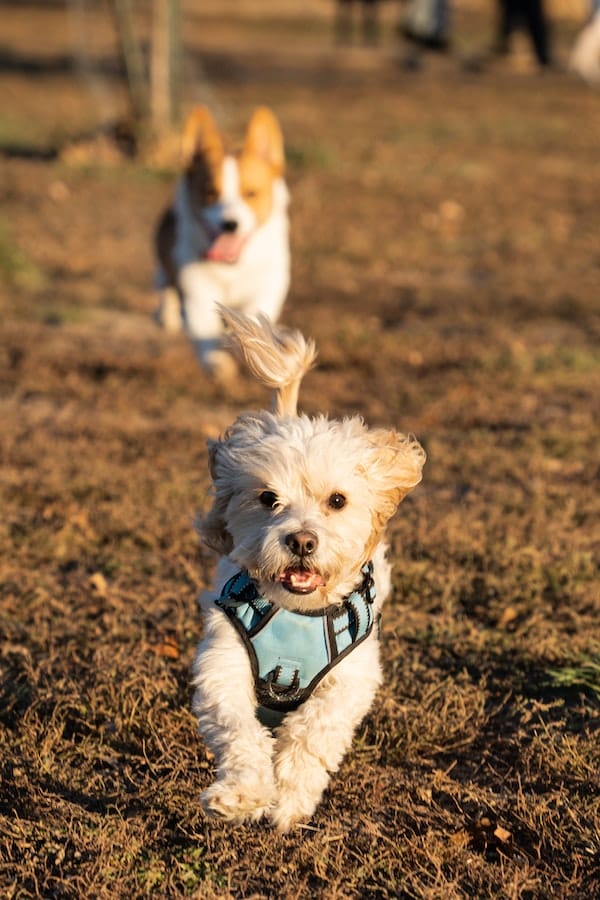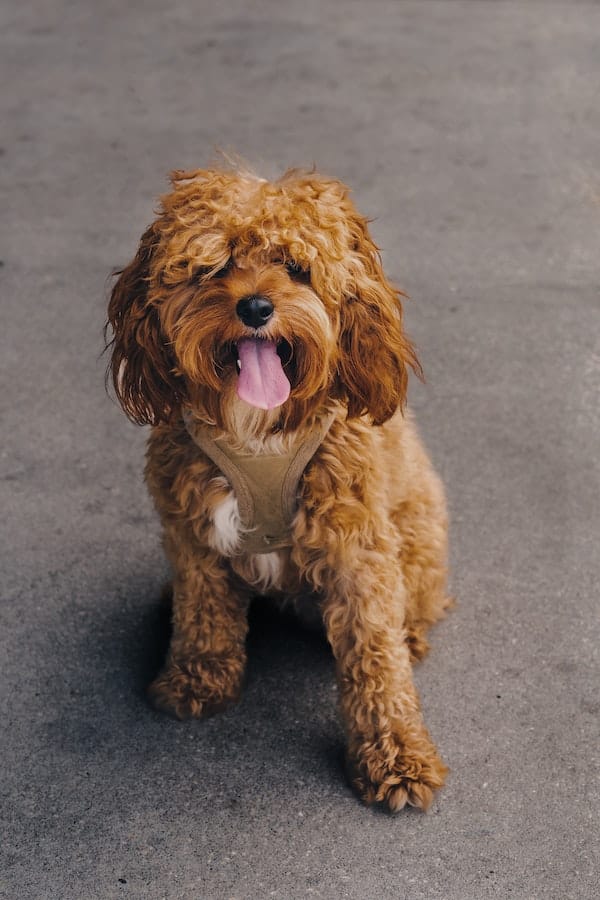
Cavapoos, with their adorable appearance and affectionate nature, make fantastic companions.
However, like any breed, they may exhibit behavior problems that can leave both you and your furry friend feeling frustrated.
In this article, we’ll explore the characteristics and traits of Cavapoos, common behavior problems they may encounter, and the underlying causes, and provide invaluable tips for preventing and addressing these issues.
Let’s embark on a journey to better understand and nurture your Cavapoo’s behavior.
Cavapoo’s Characteristics and Traits
Cavapoos, the charming crossbreed offspring of Cavalier King Charles Spaniels and Poodles possess an array of endearing characteristics and traits that make them truly remarkable companions.
Loving and friendly disposition
Cavapoos are renowned for their loving and friendly nature.
They have an innate affection for their human families, often forming deep emotional bonds.
Their warm and welcoming demeanor makes them wonderful additions to any household.
Intelligence and trainability
These intelligent canines inherit their smarts from their Poodle lineage.
Cavapoos are quick learners, which makes them highly trainable.
Whether it’s obedience training, tricks, or agility exercises, they thrive on mental stimulation and readily respond to positive reinforcement.
Playful and social nature
One can’t help but be enchanted by the playful spirit of Cavapoos.
They exude an infectious enthusiasm for playtime and social interactions.
These dogs thrive in the company of both humans and other pets, making them fantastic companions for families.
Adaptability to various living environments
Whether you reside in a spacious countryside home or a cozy city apartment, Cavapoos adapt remarkably well to their living environment.
Their size, combined with their adaptable nature, means they can comfortably thrive in various settings, provided they receive the love and attention they crave.
Low shedding and hypoallergenic coat
Cavapoos are a boon for individuals with allergies or those who prefer a cleaner living environment.
Their Poodle ancestry contributes to a low-shedding, hypoallergenic coat, minimizing the presence of allergens and reducing the need for rigorous grooming.

Common Cavapoo Behavior Problems
While Cavapoos are generally delightful and well-mannered companions, they, like any breed, may encounter specific behavior challenges that require attention and management.
Here are some common Cavapoo behavior problems:
Excessive barking
Cavapoos, like many dogs, may engage in excessive barking due to various reasons.
It’s often associated with anxiety, boredom, or territorial instincts.
To tackle this issue effectively, it’s crucial to identify the underlying cause.
Separation anxiety
Due to their affectionate nature, Cavapoos may struggle with being alone.
This can lead to anxiety-related behaviors like destructive chewing or excessive vocalization.
Gradual desensitization to alone time and positive reinforcement can alleviate separation anxiety.
Aggression
While relatively rare, Cavapoos may exhibit aggression, typically stemming from fear, resource guarding, or inadequate socialization.
Early socialization and positive reinforcement training are essential for preventing and managing aggression.
Potty training issues
Housebreaking challenges are not uncommon, especially in puppies.
The key to success in potty training lies in consistency and patience.
Establish a routine that includes regular potty breaks, especially after meals and waking up.
Jumping
Jumping up on people is a common behavior in many dog breeds, including Cavapoos.
Although it may seem harmless, it can be a nuisance, especially if your Cavapoo is large or if there are small children or elderly individuals in your household.
Training techniques can help discourage this behavior.
Destructive chewing
Cavapoos are known for their love of chewing, especially as puppies.
If not provided with appropriate chew toys, they may resort to destructive chewing of furniture or clothing.
Ensuring they have suitable outlets for their chewing instincts is key.
Digging
Cavapoos may dig for various reasons, such as boredom, anxiety, or the instinct to bury food or toys.
While digging can be a natural behavior, it can be destructive if directed at your garden or flower beds.
Providing designated digging areas and ample exercise can help manage this behavior.

What Causes Cavapoo Behavior Problems
To address and prevent behavior problems in Cavapoos, it’s essential to understand the underlying causes:
Lack of socialization
Insufficient exposure to various people, animals, and environments during a Cavapoo’s puppyhood can lead to fear-based reactions and difficulties in adapting to new situations.
Proper socialization from an early age is vital to help them build confidence and develop positive behavior.
Unmet exercise needs
Cavapoos are energetic and playful dogs that require regular physical and mental stimulation.
When their exercise needs are not adequately met, they can become restless and may engage in undesirable behaviors as a way to release pent-up energy.
Ensuring they receive daily exercise, such as walks, playtime, and interactive toys, is crucial for their overall well-being.
Separation anxiety triggers
Cavapoos are known for their affectionate nature and close bonds with their owners.
Changes in routines or extended periods of isolation can trigger separation anxiety in these dogs.
They may display behaviors like excessive barking, destructive chewing, or house soiling when left alone.
To address this issue, gradual desensitization to alone time, providing comfort items, and seeking professional guidance if needed can help alleviate separation anxiety.
Tips for Preventing Cavapoo Behavior Problems

Preventing behavior problems in your Cavapoo is a proactive approach to ensure a well-behaved and happy companion. Here are some essential tips:
Early socialization
Start socializing your Cavapoo puppy as early as possible. Expose them to a variety of people, animals, and environments to build their confidence and reduce fear-based reactions in new situations.
Consistent training
Implement consistent and positive reinforcement-based training methods.
Establish clear boundaries, use commands effectively, and reward good behavior to reinforce desired actions.
Regular exercise
Cavapoos are active dogs that thrive on physical and mental stimulation.
Ensure they get daily exercise through walks, playtime, and interactive toys to keep them engaged and prevent restlessness.
Gradual alone time
If you need to leave your Cavapoo alone, start with short intervals and gradually increase the duration.
This helps them become comfortable with being on their own and reduces the risk of separation anxiety.
Manage triggers
If you’re aware of specific situations or triggers that lead to behavior problems, take steps to avoid or manage them effectively.
This could include creating a safe space for your dog during loud events or using distraction techniques when encountering known triggers.
Seek professional help
If you find it challenging to prevent or address behavior problems, don’t hesitate to seek professional assistance from a certified dog trainer or behaviorist.
They can provide guidance tailored to your Cavapoo’s specific needs and behavior issues.
Conclusion
Cavapoos are cherished companions, and with the right care and attention, most behavior problems can be prevented or effectively managed.
By understanding their characteristics, recognizing common issues, addressing the root causes, and following proactive tips, you can ensure a happy and harmonious life with your beloved Cavapoo.
FAQs
Yes, Cavapoos are generally good family dogs, known for their gentle and friendly disposition.
Yes, Cavapoos are intelligent and trainable, making them responsive to positive reinforcement training methods.
Cavapoos benefit from daily exercise, including walks, playtime, and mental stimulation, to keep them happy and well-behaved.
Yes, Cavapoos are considered hypoallergenic due to their low-shedding coat, making them suitable for individuals with allergies. However, individual reactions may vary.
- Essential Oils Safe for Cats: What Every Pet Owner Needs to Know - May 23, 2025
- Herbal Supplements for Cats: A Natural Approach to Cat Wellness - May 21, 2025
- Signs of a Healthy Cat Coat: What Every Cat Owner Should Know - May 19, 2025


GIPHY App Key not set. Please check settings